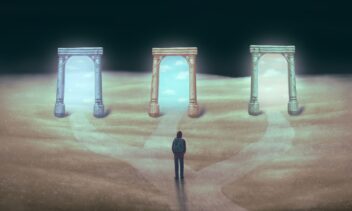This is the fifth essay of 18Forty’s “Faith in Reason” series with Rabbi Steven Gotlib, released the last Sunday of every month. Sign up for it here, and read the fourth essay here.
Jews tend not to discuss the afterlife very much. In a footnote in his new book, Judaism is About Love, Rabbi Shai Held writes that “arguably the most pervasive” misconception outside of Orthodox Judaism is that “because Christianity places such great weight on what happens after we die, generations of Jewish children have been taught that Judaism has no notion of an afterlife,” even though classical Jewish sources render such a position “totally false, almost comically so.” Personally, I was only exposed to Jewish conceptions of the afterlife in a high school class taught by Rabbi Ely Allen.
There are many routes to discussing the afterlife—what we can minimally define as the continuation of consciousness after the death of our physical bodies. One is scientific, building a case by appealing to near-death experiences (NDEs) or various philosophical arguments. Rabbi Yaakov Astor’s book, Soul Searching: Seeking Scientific Ground for the Jewish Tradition of an Afterlife, attempts to do just that by citing cases of NDEs, out-of-body experiences, past-life regression, and the like. This essay, however, will go in a different direction. We will lay out Jewish tradition’s three most common beliefs about the afterlife, which are often misunderstood or simply unknown. While more thinkers than just those quoted write about the afterlife, I have not come across substantially different takes on what the afterlife is like outside of non-Orthodox positions which assume that such a reality is mythical. But it’s first prudent to ask: Are there good reasons to not discuss this?
Thou Shalt Not … Discuss the Afterlife?
In our previous discussion, Rabbi Dr. David Schatz outlined several reasons why, ideally speaking, we might resist solving the Problem of Evil and Suffering. Might the same logic apply here? In his book Illuminating Jewish Thought: Explorations of Free Will, the Afterlife, and the Messianic Era, Rabbi Netanel Wiederblank offers a few arguments to apply the same instinct here, which primarily sources the below discussion.
Berachot 34b records that prophets were able to predict the messianic age but that Olam Ha-Bah (the World to Come) could only be known by God. Maimonides extends this idea by ruling that our souls’ experiences in Olam Ha-Bah are beyond our finite comprehension. Although Nachmanides does write in his Sha’ar Ha-Gemul that we can extrapolate the pleasure of the afterlife based on our current existence, he emphasizes that truly grasping it is impossible without being there. Due to that inability, some argue that we ought not concern ourselves with this subject altogether.
Another reason Maimonides cites against excessively focusing on Olam Ha-Bah is that our performance of mitzvot should by here-and-now objectives, not the desire for a pleasant afterlife. Accordingly, Rabbi Wiederblank writes that over-thinking Olam Ha-Bah is “potentially harmful insofar as it distracts us from our primary mission in life.” The idea that fear and speculation about metaphysical concerns can distract a person from living life to the fullest is prevalent in philosophy. For example, the Dutch thinker Baruch Spinoza argued in his Theological-Political Treatise that his contemporary religious thinkers morally failed by manipulating the fear of the unknown that many had. “When times are bad,” he wrote, “men don’t know where to turn; they ask advice from everyone, and they follow it, however stupid and clumsy it may be. They flail around, now hoping for better things and then fearing worse ones, without having any real reasons.”
One final reason offered by Rabbi Wiederblank is based on the words of Rabbi Joseph B. Soloveitchik in Halakhic Man:
The Halakhah is not at all concerned with a transcendent world. The World to Come is a tranquil, quiet world that is wholly good, wholly everlasting, and wholly eternal, wherein a man will receive the reward for the commandments which he performed in this world. However, the receiving of reward is not a religious act; therefore Halakhic Man prefers the real world to a transcendence existence because here, in this world, man is given the opportunity to create, act, accomplish, while there, in the World to Come, he is powerless to change anything at all.
As Rabbi Wiederblank summarizes, “Judaism focuses on perfecting our lives and the world we live in,” not on preparing us for an afterlife in which no creative actions are possible. This finds support in the mere fact that Olam Ha-Bah is not once directly mentioned in the Torah!
And yet, there are nonetheless several reasons why understanding Judaism’s view of the afterlife is worthwhile. One is practical: Remembering our desired afterlife can serve as a sort of marshmallow experiment for delayed gratification. In realizing the afterlife, Rabbi Wiederblank says, a person can motivate themselves “to forgo immediate pleasure knowing that he stands to gain far more by delaying gratification.” He acknowledges that such a Pascal’s Wager-esque motivator may not be ideal but can be helpful to many. Rav Eliyahu Eliezer Dessler even invokes this reasoning in his Michtav M’Eliyahu, writing that “the righteous would envision images of Gan Eden and the incredible pleasure for those who follow the path of God, and thereby they would defeat their desires and pass tests.”
There is also no shortage of psychological studies demonstrating that belief in an afterlife is positively correlated with happiness in this world. (Here is one example of many.) None of the above factors, however, are perfect motivators. Rabbi Dr. Sam Lebens pointed out in his 18Forty interview that if religion becomes too much about heavenly reward or hellish punishment, one might be tempted to simply opt for the religion that provides the best heaven and worst hell based on an intuitive version of Pascal’s Wager. Likewise, the psychological benefit of believing in an afterlife is only beneficial insomuch as the psychological fear of hell does not overly counteract it.
Another practical reason to care is that Mishnah Sanhedrin 10:1 states that people who deny certain things, including the future resurrection of the dead, lose their share in Olam Ha-Bah. Maimonides even codifies in his 11th principle of faith that “God gives reward to one who performs the commandments of the Torah and punishes one who transgresses its admonitions and warnings. The great reward is Olam Ha-Bah, and the punishment is the cutting off of the soul [from this reward].” One’s understanding of the afterlife may well impact their ability to obtain it. Unpacking Judaism’s belief(s) about the afterlife, then, is of the utmost importance.
The Kabbalistic View on the Afterlife
On that note, what does Judaism believe about the afterlife? The Conservative theologian Rabbi Dr. Neil Gillman wrote in his Believing and Its Tensions that “theologies of the afterlife represent our attempt to reinstitute God’s power over human life” that the concept of death itself seems to challenge. This challenge has been faced in different ways throughout the Jewish tradition.
Bereshit 2:7 tells us that Hashem blew a soul into Adam. Rav Chaim Vital writes in Sha’arei Kedushah that after death, the soul “sheds the garment of the body and wears a different, spiritual garment that is clear and clean in its place.” This is perhaps the most straightforward Jewish understanding of what happens after death. This basic understanding seems to be consistent with various theories of consciousness explored elsewhere.
Rabbi Wiederblank notes that the position of the Nachmanides “reflects the dominant, Kabbalistic position” and summarizes it like this:
When a person dies, his soul and body separate, with the soul continuing to exist in the olam ha-neshamot, the world of the souls. This includes Gan Eden and Gehinnom. Gan Eden and Gehinnom exist now, while olam ha-ba will be created following the conclusion of the messianic era. At that point, the body will reunite with the soul and enjoy the ultimate spiritual experience.”
Other kabbalists further explore a process in between these steps called gilgul, or reincarnation.
The most famous work on the subject is Rav Chaim Vital’s Sha’ar Ha-Gilgulim, based on the teachings of the Arizal, which was based on a section of the Zohar. This work details the reincarnation cycle of a soul on its way towards full purification. While reincarnation is not usually seen as mainstream within Jewish theology, philosophers such as Yehuda Gellman have recently put forward strong arguments for its acceptance (see my review of Gellman’s latest book for a summary of his approach).
The Rationalist View of the Afterlife
The second major view comes from Maimonides. This view, unlike the position of Nachmanides, sees Olam Ha-Bah as entirely spiritual, based on a Talmudic passage (Berachot 17a) which says that “in Olam Ha-Bah, there will be no eating and drinking, no procreation, no commerce, no jealousy, no enmity, and no rivalry—but rather the righteous will sit with crowns on their heads and enjoy the radiance of the Shechinah.” There will ultimately be a resurrection of the dead, included in Maimonides’ 13 Principles of Faith, but it is much less clear what sort of purpose it ought to serve in Maimonides’ understanding of Olam Ha-Bah. This apparent uncertainty with a Maimonidean framework has led scholars to argue that perhaps Maimonides did not actually believe in a physical resurrection from the dead at all or that, at the very least, physical resurrection is seemingly inconsistent with a Maimonidean religious worldview. In Professor Moshe Halbertal’s words,
If physical reward is merely a means for attaining the higher existence of human intellectual perfection, why should the soul be reunited with the body after a person’s death? On the face of it, returning the soul to the body seems more a punishment than a reward. Moreover, we have seen that the immortality of the soul is not a wondrous miracle but simply the natural result of a person’s life. Resurrection of the dead, in contrast, is very much an incomprehensible and wondrous event – as well as unnecessary. Not surprisingly, Maimonides’ philosophical disciples took the view that resurrection is nothing more than an allegory for immortality of the spiritual soul.
Rabbi Wiederblank, on the other hand, maintains that it makes sense for a Maimonidean conception of Olam Ha-Bah to still include bodily resurrection:
While he does not address this question explicitly, it seems that the resurrection will grant an opportunity for tzaddikim to reach a higher stature in olam ha-ba… Rambam understands olam ha-ba as an opportunity to reach profound understanding of God, and this understanding is the natural consequence of spiritual and intellectual achievements attained while a person is alive. The resurrection offers another chance to reach higher levels of understanding God, enabling the righteous to attain an even higher level of communion when they subsequently die and return to olam ha-ba.
Moreover, resurrection will enable intellectual achievement (and this olam ha-ba) for those who lacked such opportunities during their lifetime. Indeed, it seems unfair that a righteous person who died young should be limited in his experience of the pleasures of olam ha-ba. Techiyat ha-meitim offers such a person a long, tranquil existence with ample occasions to thrive intellectually.
Having discussed the primary approaches to the goal of the afterlife, there is one more aspect that must be discussed—hell. Even when one is taught growing up that Judaism believes in an afterlife, it is quite common to hear that “Judaism does not believe in hell,” which is only partially true. If one defines hell, as Richard Swinburne does, as a place where souls suffer “eternal physical pain in hell as a punishment for their sins,” then Judaism does not have a comparable concept. The Mishnah Eduyot 2:10 states that a stay in Gehinnom only lasts for 12 months. Indeed, the Ashkenazi custom is that Kaddish is only said for 11 months following a relative’s passing, lest one give the impression that the deceased are so wicked that all 12 months be spent there. (See Rema on Shulchan Aruch Yoreh Deah 376:4 to learn more.) The Jewish tradition speculates very few individuals earn a longer stay. Judaism, then, has a conception of hell, but it is closer to what non-Jews might call Purgatory.
In a future essay, we will directly address the question of why Judaism ought to be accepted more than other religions. For now, suffice it to say that this view of resurrection avoids the pitfall of many Christian approaches, which eternally damn those who die too young to have been able to accept Jesus as their Messiah.
Recommended Reading
Illuminating Jewish Thought: Explorations of Free Will, the Afterlife, and the Messianic Era, by Rabbi Netanel Wiederblank
This is a thorough exploration of positions regarding the afterlife and messianic age from an Orthodox perspective.
Are We Bodies or Souls? by Richard Swinburne,
The Christian philosopher explores whether or not souls exist in conversation with modern philosophy and neuroscience.
Soul Searching: Seeking Scientific Ground for the Jewish Tradition of an Afterlife, by Yaakov Astor
An Orthodox rabbi searches to corroborate Jewish views of the afterlife in conversation with science. Note: Some are likely outdated.
The Death of Death: Resurrection and Immortality in Jewish Thought, by Neil Gillman
This is an exploration of Judaism’s beliefs about the afterlife from a Conservative, scholarly perspective.
—
Steven Gotlib is Director of Glebe Shul: The Capital Jewish Experience in Ottawa, Ontario.








